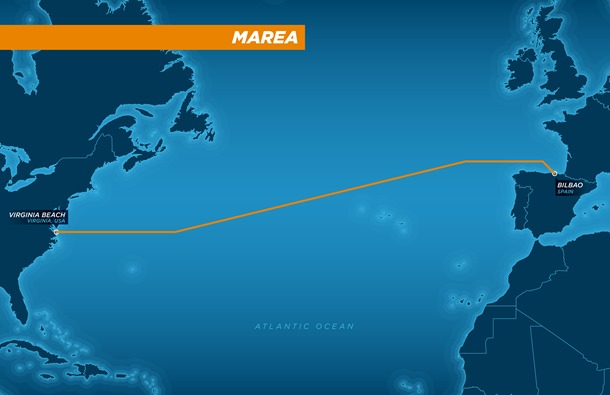Facebook, Microsoft, Telxius Transatlantic Cable Is Complete
September 26, 2017
The new underwater cable between North America and Europe, built through a partnership between Facebook, Microsoft and Telxius (a subsidiary of Telefónica), is now complete. Dubbed Marea (Spanish for “tide”), the new 4,000-mile subsea cable runs at a depth of 17,000 feet under the Atlantic from Virginia Beach, Virginia to Bilbao, Spain and has been under construction since August 2016. Marea will offer a capacity of 160 terabits per second, and will help meet the demand for high-speed Internet and cloud services.
VentureBeat reports that Marea is “the latest in a line of collaborations involving major U.S. technology companies and subsea cable infrastructure.” In 2015, Microsoft joined a consortium with China Mobile, China Telecom, China Unicom, Chunghwa Telecom and KT Corporation to connect its global data centers, via underwater fiber optic cables, to China.
Google and Facebook also partnered in 2016 on “a new submarine cable project between Los Angeles and Hong Kong, while a new Google-backed transpacific Internet cable from Japan to Oregon opened for business.” Google is also supporting a new undersea connection between Asia and Australia, dubbed Indigo.
Rival Amazon took its first steps in undersea cables last year “when it plowed money into the transpacific Hawaiki cable, which should improve latency for Amazon Web Services (AWS) users in Australia and New Zealand.”
Companies are investing to meet customer expectations. “When it comes to computing, speed matters,” said Microsoft cloud infrastructure and operations corporate VP Suresh Kumar. “So does resiliency.” According to VentureBeat, “though the cable should help bring greater speeds to connections between North America and Europe, it may also have a knock-on effect for Asia and Africa, which are connected via the same landmass.”
In addition to Marea, Microsoft has taken other steps to improve its cloud service offerings. The company just announced so-called Availability Zones to its Azure cloud platform, which are “clusters of data centers within a single cloud region that are geographically isolated from one another and are designed to protect against location-specific failures in one of the other zones.”


No Comments Yet
You can be the first to comment!
Sorry, comments for this entry are closed at this time.